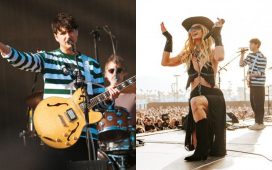Just before Billie Eilish won album of the year at the Grammys on Sunday night, she was caught on camera. “Please don’t be me, please,” she appeared to be saying, as if appalled by her own success.
It had been an extraordinary evening. The 18-year-old whispery pop innovator swept all of the “big four” categories – album of the year, record of the year, song of the year and best new artist – with her debut album When We All Fall Asleep, Where Do We Go?. She became only the second person in history to do so – and the first woman and youngest person (the first person to win all four of these awards in one go was Christopher Cross, in 1980). She also broke a record previously held by Taylor Swift. A decade ago, Swift became the youngest person to win album of the year, aged 20. Eilish unseated her, with an offering that would never have seemed likely to seduce the mainstream. As her brother and collaborator Finneas explained in their acceptance speech: “We wrote an album about depression and suicidal thoughts and climate change … We stand up here confused and grateful.”
Back when Swift was the one sweeping awards ceremonies with country-tinged love songs, no one would have predicted that her successor would look and sound like Eilish: a deadpan goth who was once described by rapper Tyler, the Creator as a “17-year-old girl who dresses like a quarterback”. But for anyone who has been paying attention, Eilish’s Grammys dominance shouldn’t come as a surprise. After all, she is the quintessential Generation Z pop star (and the first true global star to be born in this millennium), with a teenage fanbase clamouring around her just as intensely as one did around Swift a decade ago.
The singer has been making music since the age of 13, when she and Finneas (then 17) created Ocean Eyes, a gentle swarm of an electronic pop song, in his bedroom. They uploaded it to SoundCloud and the song went viral thanks to Eilish’s fragile falsetto vocal and the pair’s talent for a sweeping, evocative hook. But as they kept writing together – helped by their actor/artist parents, who homeschooled them in music theory and slept in the living room of their Los Angeles home to give them the room to create – Eilish’s appeal deepened.

Weaving in snippets of field recordings, including a dental drill, and samples from the US version of The Office, the pair developed a strange, experimental kind of pop music that borrows from the world of ASMR YouTube videos (in which closeup recordings of whispers and hair-brushing are used to trigger a tingling response). The dark, depressive themes of Eilish’s lyrics (“I wanna end me”, goes one of her catchiest refrains), her low-key vocal style and her androgynous fashion sense may have held her back from mainstream pop fame in the past. But to Gen Z, those are all the things that make her beloved: she’s a nonchalant, nihilistic figure who rejects everything that pop girls have historically been told they have to be in order to be successful. Where people’s idea of a pop star has traditionally been upbeat, bombastic and focused on performance, Eilish is moody and quiet, made for streaming in the background or playing on your headphones. In some ways, you might say Taylor Swift has been succeeded by the anti-Taylor Swift.
Her style is the first thing many notice about her – and the biggest signal that she refuses to be boxed into gendered expectations of pop stars. At the Grammys on Sunday, she wore a black and green customised Gucci suit that covered her body entirely covered, the loosely cut trousers trailing over her sneaker-clad feet. In a Calvin Klein campaign last year, she explained that the reason she dresses in baggy clothes is that “nobody can have an opinion because they haven’t seen what’s underneath. Nobody can be like: ‘She’s slim-thick,’ ‘She’s not slim-thick,’ ‘She’s got a flat ass,’ ‘She’s got a fat ass.’ No one can say any of that because they don’t know.”
She knows all too well the scrutiny that the bodies of female stars are subject to – and, in true Gen Z fashion, she has chosen to opt out of all that noise. Her stylist, Samantha Burkhart, once told Vogue Australia that Eilish “lives in this place of genderlessness and ambivalence towards clothing, which I think is very freeing in a lot of ways. She is not buying into the hypersexualised idea of what femininity is.”
If pop music under the reign of Swift, Katy Perry and Lady Gaga in the 00s was about choruses you could scream, Eilish’s is pop music to weep into your pillow. Her latest single, Everything I Wanted, is an aching, gentle meditation on how her sudden rise to fame made her suicidal; an older cut, the creepy Idon’twannabeyouanymore, is a bitter expression of low self-esteem and negative self-talk. For kids who feel as if they are battling these same issues, Eilish’s self-loathing can sound like catharsis.
And there are a lot of them. In the UK, there has been a 48% rise in anxiety and depression among teenagers in the past 15 years. This is a generation who have been contending with austerity, fear of the climate crisis, ever-growing exam pressures and social media scrutiny as they have grown up – and a generation who are constantly failed by a lack of access to mental health services. Yet it is also a generation who are more acutely aware of their mental illness than others – one American survey found that Gen Zers were 27% more likely to report their mental health as “poor” than adults.

This isn’t to say Eilish’s introspective style is unprecedented – rather, it harks back to the emos who ruled the early 00s – a genre that is currently experiencing a revival of its own. My Chemical Romance, who captured a generation of misfits with their breakout single I’m Not Okay (I Promise) in 2004, recently sold out their two UK comeback shows in minutes. Eilish, along with eyelinered contemporaries including Lauv and Yungblud, is their spiritual successor – without the thrashing guitars. If you removed the hushed ballad audio from the video of her hit When the Party’s Over, in which she wears thick chains and bleeds black liquid from her eyes, it could easily pass for a 00s emo classic.
One thing, of course, that sets her apart is her gender. The emo mould of the 00s was undoubtedly male. Hannah Ewens, a music journalist and the author of Fangirls: Scenes from Modern Music Culture, notes that: “She’s not singing like, say, Britney did about being a girl and teen heartbreaks, she’s leaning into the darkness in her whole vibe as an artist, in a way that iconic male artists like Slipknot and Marilyn Manson did. She’s doing what iconic rock artists did before her – exploring themes like darkness, mental health and being aggressively yourself whatever the consequence, with a very strong visual element and aesthetic, but it’s authentically updated for a Gen Z audience.”
This blurring of genre and gender is what Ewens believes has won Eilish a fanbase across demographics – and, unusually, the approval of critics and the Grammys committee, too. “It’s quite rare for someone with a teen-girl-heavy fanbase to be accepted in this way critically,” Ewens says. “Possibly it has something to do with the fact that she’s encapsulating something that’s zeitgeist-y, new and ultimately fairly genderless.”
A pop star shouldn’t have to deny or cloak her femininity in order to be taken seriously – and that is a battle that Swift has recently taken on, with songs such as The Man that address stark differences in the way male and female musicians are talked about. Eilish herself says she owes a debt to Swift – who seemed to foresee Eilish’s success In a speech she gave at the Billboard Women in Music event in 2014. While accepting her woman of the year gong, Swift said: “Right now, your future woman of the year is somewhere in a piano lesson, in a choir, and we need to take care of her.” In 2019, Eilish won the same award and remembered that when Swift won: “I was 11 at the time, and I was in a choir and learning to play piano, and you took care of me.”
But even so, the new pop-girl archetype that Eilish is creating is a radical departure from what we have expected of pop heroines in the past. It is impossible to say what the next star to break Eilish’s record for Grammy wins will look or sound like – she appears to be one of those rare artists whose unlikely breakthrough signals a turning point for the whole industry. Her totally untested route to fame indicates that, for this generation, the unspoken rules that 00s female pop stars had to follow may finally be starting to fall away.













